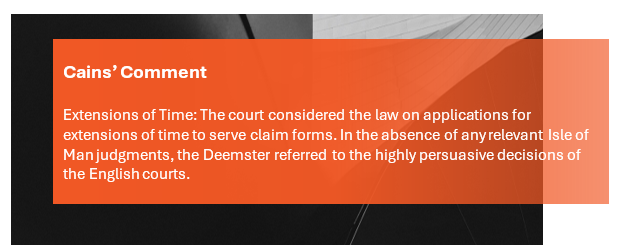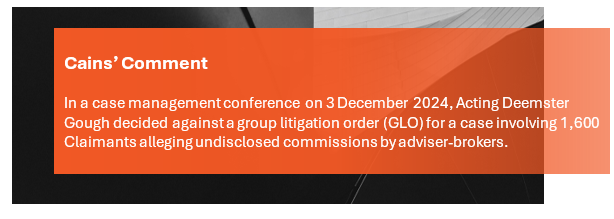Extensions of Time to Serve the Claim Form
___________________________________________________________________________________________________________________________________________________
Principal Contracts Limited (In Voluntary Liquidation) Acting by its Liquidator Craig Mitchell v Rowe & Otrs, 14 January 2025i

The case concerned an application by defendants discharging two orders by which the claimant had obtained an extension to the period for service of the claim. The two orders had originally been made without notice.
The Court confirmed that Rule 4.4 of the Isle of Man High Court Rules 2009 (the “Rules”) concerning applications for extensions of time for serving a claim form was identical in all material respects to the equivalent provisions in the English Civil Procedure Rules.
Accordingly, the Court held that “It is thus convenient that such applications be judged by reference to the extensive case law of the English courts, there being no relevant Manx decisions and no reason why the English decisions should not be highly persuasive in this jurisdiction.”
The Court noted that the English case of Al-Zahra (PVT) Hospital and others v DDM [2019] EWCA Civ 1103 contains “the principles to be derived from three of the most important authorities”: Hashtroodi v Hancock [2004] 1 WLR 3206, Hoddinott v Persimmon Homes (Wessex) Ltd [2008] 1 WLR 806, and Cecil v Bayat [2011] EWCA Civ 135.
Having considered the English case law, the Court distilled the law into 7 key principles relevant to the applications before it:
- There is no “checklist” in Rule 4.4 – there must be evidence of “all the circumstances relied on” and “a full explanation as to why the claim has not been served”. The power to extend time must be exercised in accordance with the overriding objective.
- Where a very good reason is shown for failure to serve within the specified period, an extension of time will normally be granted. Conversely, the weaker the reason the less likely.
- Time limits must be adhered to unless there is a good reason for a departure.
- Financial difficulty is not a good reason to postpone service of a claim form.
- The Court is unlikely to grant an extension of time for service of the claim form if no good reason has been shown for failure to serve within four months of issue.
- Awaiting for example a report may be a good reason for an extension of time to serve particulars of claim but does not justify a delay in service of the claim form.
- The Court should not decide debatable issues of limitation in interlocutory applications of this type. If a defendant can show that he will or may be deprived of a limitation defence if time for service of a claim is extended, an extension should not be granted or should if granted be set aside.
The judgment can be found here: https://www.judgments.im/content/J3302.htm
Directions in group litigation
___________________________________________________________________________________________________________________________________________________
Morrison & Otrs v Utmost International Isle of Man Limited & Otrs, 21 January 2025ii

This judgment details the decisions, with reasons, of Acting Deemsteriii Gough during a case management conference held on 3 December 2024 in order to set directions to take the matter forward to trial. The case involves approximately 1,600 Claimants who allege that their adviser-brokers received commissions on the investments they arranged, which were either undisclosed secret commissions or commissions which were not disclosed in full.
The Claimants proposed that either all the claims be tried together or, that the Court makes a group litigation order (“GLO”) under the Rules. It is a necessary feature of a GLO that there are common issues such that the Court is able to determine those issues in a limited number of claims and then to apply them to the non-test claimants without unfairness.
The Defendants argued that a GLO is designed to manage claims which give rise to “group issues” which are defined as “common or related issues of fact or law” under Rule 3.32 and that the case was therefore unsuitable for a GLO due to the absence of genuinely common issues across the claims. The Defendants instead proposed an alternative structure that would have some of the similarities to a GLO (in that it involves the determination of test claims) but which will not bind the non-test claimants without more.
Acting Deemster Gough noted that the modern authorities referred to by the advocates seem to be “veering somewhat away from GLO’s”. In Manning & Napier Fund Inc v Tesco Plc [2017] EWHC 2203 (Ch), Asplin J endorsed Sir Michael Turner’s words in Hobson v Ashton Morton Slack and Ors [2006] EWHC 1134 (QB) that “what is required before [a GLO] is made is that there must be no other satisfactory means of solving the dispute”.
In weighing up the similarities across the claims against the differences, Acting Deemster Gough held that the GLO was not suitable because of the risk of unfairness to the Defendants, especially in relation to the non-test claims. Non-test Claimants, in respect of whom the Defendants may well have a defence, could end up receiving an “undeserved windfall”. However, the Deemster commented at paragraph 47 of the judgment that in actively case managing a complex multiparty claim, it is important to balance fairness and pragmatism:
“The peculiar circumstances of the case and its size have to be taken into account bearing in mind the overriding objective. The issues of trial length timetable and the start date for the trial are issues which all go into the mix in deciding the most appropriate and fair way to go about this large-scale litigation. The interests of the Claimants and the Defendants are to be taken into account and this requires give and take from all concerned. I should encourage and facilitate settlement where possible.”
Paragraph 29 of the judgment outlines the Deemster’s proposal for a “middle way” in which a limited number of test claimants are chosen for trial to a finding of liability (or not) with a pre-agreed (or mandated) list of common issues that, if determined in the test claims, would bind the remaining claims: “That would hopefully dispose of many, and maybe the majority of, the remaining claims and leave individual case specific issues of the remainder to be carved out and dealt with separately”.
The judgment can be found here: https://www.judgments.im/content/J3307.htm
Permission to appeal to the Judicial Committee of the Privy Council
____________________________________________________________________________________________________________________________________________________
Kaveh Moussavi v VR Global Partners, L.P. and Broadsheet LLC (In Liquidation) (acting by its liquidator), 29 January 2025

In the Staff of Government Division’s judgment delivered on 27 November 2024, Mr Moussavi was refused permission to appeal from the First Deemster’s refusal to join him to certain liquidation proceedings in the High Court (judgment dated 10 June 2024) (the “November Judgment”).
This judgment concerned Mr Moussavi’s application for permission to appeal to the Judicial Committee of the Privy Council (the “JCPC”) against the November judgment.
Section 19A(3) of the High Court Act 1991 provides:
“No appeal may be made against a decision of a judge or court under this section to give or refuse permission …”.
The Staff of Government Division noted that the purpose of section 19A(3) was to achieve finality. In any event, none of the suggested grounds of appeal had a real prospect of success nor did they raise an arguable point of law or any point of law of general public importance appropriate for consideration by the JCPC. Permission was refused.
The judgment can be found here: https://www.judgments.im/content/J3312.htm

Please note that this note does not constitute legal advice but is provided as non-reliance guidance only. For more information on Isle of Man Litigation Law, please contact: Robert Colquitt or Tara Cubbon-Wood
References:
i Robert Colquitt (Cains) acted for the Claimant.
ii Jonathan Nash KC (3VB) with Robert Long (Cains) acted for the Fourth Defendant.
iii The term used to refer to judges in the Isle of Man judiciary.
_______________________________________________________________________________________________________________________________
The Cains’ IOM Judgment Journal (January 2025) can be downloaded here: IOM Judgments – January PDF
